Klaus-Peter Siegloch | |
|---|---|
 Siegloch in 2015 | |
| Born | 15 May 1946 |
| Nationality | German |
| Occupations |
|
| Awards | See Awards |
Klaus-Peter Siegloch (born 15 May 1946) is a former German journalist and lobbyist.
Klaus-Peter Siegloch | |
|---|---|
 Siegloch in 2015 | |
| Born | 15 May 1946 |
| Nationality | German |
| Occupations |
|
| Awards | See Awards |
Klaus-Peter Siegloch (born 15 May 1946) is a former German journalist and lobbyist.
Siegloch was born in Hamburg. He studied sociology, economics and political science at the University of Hamburg, graduating in 1973. Siegloch worked as a television journalist between 1973 and 2011, for German public broadcaster ARD from 1973 to 1988 and from 1988 to 2011 for ZDF.
His professional career began in 1973, as an editor at NDR, where he worked on the Tagesschau and on regional broadcasts; from 1982 to 1985, he also presented news magazine Tagesthemen . Siegloch moved to ZDF in 1988, where he became head of the main editorial department for domestic affairs, working on such programmes as the Politbarometer. Siegloch became the head of ZDF's Bonn studio in 1991, before becoming deputy editor-in-chief of ZDF's news the following year. From 1995 to 1999, Siegloch was ZDF's chief Washington correspondent. In 1999, Siegloch became chief presenter of the 7pm heute news, alternating with Petra Gerster. From 2003 onwards, he was deputy editor-in-chief of ZDF, and head of the news department; alongside these duties, he presented Heute Journal between 2003 and 2007, acting as a regular substitute for Marietta Slomka and Claus Kleber.
In June 2007, Siegloch returned to Washington, where he once again became chief Washington, D.C. correspondent. From December 2008, he was head of the ZDF office in New York, responsible for reporting on Wall Street, the United Nations, and Canada. Siegloch retired from ZDF in April 2011 for age reasons. [1] He went on to become president of the German Aviation Association (BDL), a position which he held until April 2016. Besides his profession, he was member of the Board of Trustees of the Bertelsmann Stiftung, for example. [2]
Siegloch is married and has two children. [3]

ZDF, short for Zweites Deutsches Fernsehen, is a German public-service television broadcaster based in Mainz, Rhineland-Palatinate. Launched on 1 April 1963, it is run as an independent nonprofit institution, and was founded by all federal states of Germany. ZDF is financed by television licence fees and advertising revenues.

Tom Buhrow is a German journalist who has been serving as intendant of the WDR since 2013. He also served as Chair of the ARD from 1 January 2020 to 31 December 2021 and from 4 August to 31 December 2022.
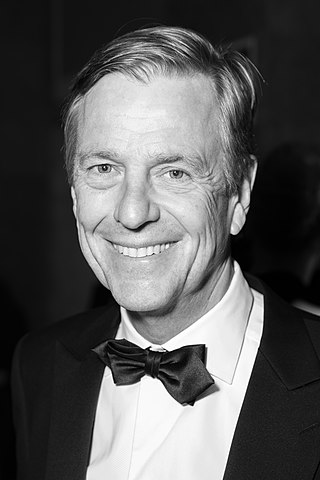
Claus-Detlev Walter Kleber is a German journalist and former lawyer. He anchored heute-journal, an evening news program on ZDF, one of Germany's two major public TV stations. He is also known for his expertise in United States politics and German-American relations, as evidenced by his 2005 bestseller Amerikas Kreuzzüge.

Nikolaus Brender is a German journalist. He was the commissiong editor of the German public broadcasting station ZDF between 2000 and 2010.
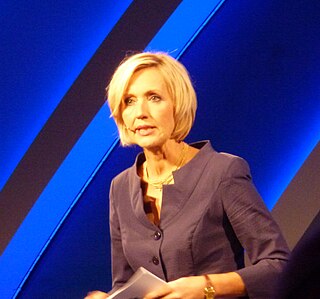
Petra Gerster [] is a German journalist and news presenter.

Marietta Slomka is a German journalist who has been the anchor of TV news show heute-journal since 2001.

Ulrich Kienzle was a German journalist and author. He was known for specializing in the politics and culture of the Middle East. He worked for several broadcasters, including German public television networks ARD and ZDF. He was one of the few Western journalists to interview Muammar Gaddafi in the 1970s. In 1990, he was the last western journalist who interviewedSaddam Hussein, days before Gulf War started. Kienzle was known for appearing on Frontal, a ZDF series of political discussions also featuring broadcast journalist Bodo Hugo Hauser. He was one of the most famous journalists in the six German speaking countries.

The heute-show is a German late-night satirical television program airing every Friday evening on public broadcasting channel ZDF. A conceptual adaptation of The Daily Show with Jon Stewart, it is presented by German comedian and journalist Oliver Welke. Heute show presents the weekly news with funny or sarcastic and cynical comments, especially focusing on issues that are subject of the latest political discussions in Germany. Welke argues that he might help to make people interested in politics and might help to point out "what goes the wrong way" in parliamentary debates, in ministries, in institutions, and in parties. Sometimes, he simply mocks "people who deserve it" in his show.

Klaus Bresser is a German journalist and television presenter.

Dunja Hayali is a German journalist and television presenter for public broadcaster ZDF. She has an interest in sports, and is also known for her social activism.

Christian Sievers is a German journalist and evening news anchor.

Anne Gellinek is a German journalist and TV host who has been one of the anchors of heute-journal, a television news magazine broadcast on German public-service broadcaster ZDF, since 2022.
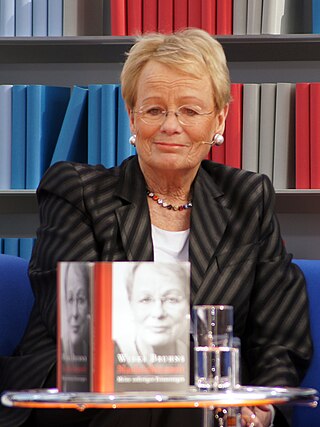
Wibke Gertrud Bruhns was a German journalist and author. In 1971, she was the first woman to present the news on German public television. She was a journalist for several television stations, and for the Stern magazine in Jerusalem and Washington, D.C. She was also a speaker at Expo 2000.

Bettina Schausten is a German journalist.
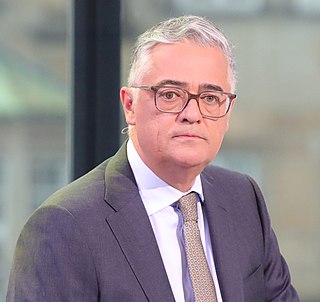
Matthias Fornoff is a German television journalist.
Shakuntala Banerjee is a German television journalist and reporter.
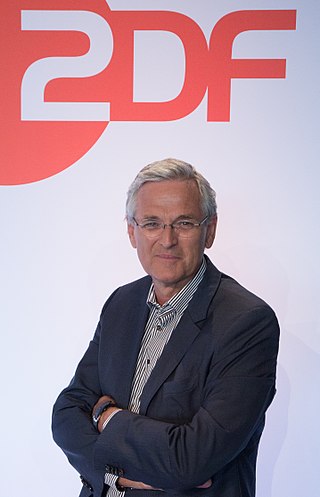
Peter Frey is a German journalist. He has been editor-in-chief of ZDF since 1 April 2010.
Franz Josef Wagner is a German author and journalist. He was editor-in-chief of Bild, Germany's largest newspaper, launched Elle magazine's German edition, and has written a number of books, one of which was adapted for television.
Barbara Dickmann is a German journalist.
Barbara Hahlweg is a German journalist and television presenter of the ZDF program heute.